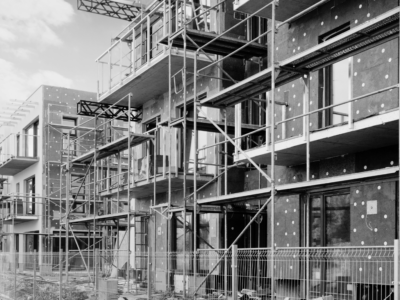The economy and the property sector are inextricably linked. Buyer-behaviour, investor appetite and lender/landlord confidence are most commonly examined and referenced when there is significant damage to or speculation about the economy.
Interest rates are at a record low, demand for housing is high and the press have been reporting a rebound in the market due to ‘pent up demand’ from the UK population who have been in lockdown for the last 14 weeks. Rishi Sunak has announced a temporary raise of the Stamp Duty threshold to £500,000 until March 2021 to boost the property market and help buyers struggling because of the coronavirus crisis.
We spoke to a selection of property professionals from Oxford and London to ask about their experiences since lockdown easing measures have started to be announced and their projections for the future of the market.
The residential property market opened its doors again on 12 May after six and a half weeks of restrictions which included a ban on viewings and valuations.
Zoopla, who provide property market statistics and trends, estimate that 373,000 transactions were put on hold during this period at an estimated value of £82bn.
Since lockdown easing has come into effect, house listing sites such as Rightmove are recording record amounts of visits and press reports are rife about a spike in residential sales and rentals.
Chris Dixey, Director of Sales for Oxfordshire based estate and letting agent Breckon & Breckon says that the few weeks since they opened their doors again have been ‘busier than anyone thought they would be’.
Despite holding the business and client-service levels together during the lockdown by completing on sales which had already been agreed, they were apprehensive about opening again.
This was not just because of the concern about the level of business that may (or may not) come through the door but, how this might be perceived by the local community and the worry that agents might be seen to be spreading the coronavirus.
So far, their experience has been ‘oddly encouraging’ says Dixey although, he points out that he would be irresponsible not to be wary or have any concern about what might happen moving forward.
Middleton Advisors who source prime property on behalf of clients wanting to purchase or rent have had a similar experience in that their client enquiries for June are so far quadruple what they were last year.
Tom Hudson, Founder and Head of Country Business says that there are plenty of interested clients in the market and supply is starting to pick up, they have also seen sales of stock which has been on the market for some time.
Tom’s clients are predominately cash-buyers, many of whom have been planning to move for a while brought their purchases forward. Although it is hard to know whether buyers are serious or are window-shopping, a long period of down-time does tend to have this effect, with decisions about moving to a new house most commonly made over the Christmas period.
Prior to the COVID-19 pandemic, Hudson predicted that there would be a rise in the country market in 2020 and he still thinks there will be an increase in prices for good quality properties.
Dixey has also seen that the demand for country homes with gardens massively increase with buyers looking for ‘the kind of place that you would want to be locked down in’.
Some buyers who have been looking at the same four-walls for 14 weeks have realised that their home is no longer fit-for-purpose whereas others are looking to be closer to their relatives, with family now being deemed more important than ever.
‘The home has now become more of the castle’ according to Marcus Gunn, Mortgage Advisor for Carbon FC and this has led to people revaluating their needs.
In several situations, decisions have been accelerated. For example, some who would typically be city-dwellers for a few more years are now looking for their country home earlier in the property ownership life-cycle with half a mind on the fact that they will no longer need to commute due to successes achieved working from home and the notion that the physical office will forever be changed.
Others have realised that they are happy in their current home having lived and worked (and in some instances schooled) in it. They are simply making some adjustments to make their working-from-home experience more comfortable, for example says Marcus ‘Log cabin sales have gone through the roof so that people can have an office in the garden’.
Carbon has seen houses going above the asking price since lockdown easing, with some clients having to put in sealed bids – often the sign of a buoyant market.
Marcus is however cautious in predicting whether this will fizzle out or become a systemic change. Lenders are fearful of being over generous, some have withdrawn the 90 and 95% mortgages and there is caution over loan-to-value multiples.
It is rare for banks to grant loans to those who are furloughed from employment and there is a reluctance to provide mortgages for those employed in certain sectors such as travel, leisure and hospitality.
This means that the highly-regulated mortgage market in which he operates has become more complex and mortgage applications have ‘become more like a research project than ever before’.
It is exceptionally cheap to borrow money for those that can afford to so those with stable jobs who are looking at the long-game are in a good position.
Property owners looking to sell are also faring well as there are fewer properties on the market, so competition is high.
Low interest rates have also resulted in an uptick in interest in the buy-to-let space, an area which had fallen by the wayside due to the increasing obligations on the private landlord.
Like many, Marcus likens the current market to the financial crisis of 2007 ‘it is comparable in a way, but the difference is that people are still confident in property’.
Investments
Stuart Bradney who runs the property development and investment side of Carbon FC says that ‘a lot of business being done, but by fewer people’, most of his investor clients are ‘sitting on their hands’ and waiting to see how the market unfolds but those who are active are using cash and low interest rates to their advantage.
Bradney believes that the Investment economic-cycle will change with private landlords looking to ‘dump’ property due to tax disadvantages and the over-regulation of the sector.
‘Any change in the economy provides opportunity in the property market as there is movement’ says Sarah Gardener, Partner and Head of Real Estate & Construction for Shaw Gibbs.
This is an opportunistic time, with some being in a very strong position because they can leverage the competitive environment that Marcus and Stuart have covered.
Sarah has in fact experienced more property enquiries since lockdown-easing from her clients who are looking to diversify their family wealth or income streams by investing further into the market.
The stock market has taken a hit, and although the UK stock market has partially recovered, there is still a lack of confidence in some investments.
This coupled with questions around sustainability of some sectors has meant that these clients are interested in generating additional income through property rentals as another layer of security should this (or another) pandemic hit the business-world or their personal finances again with force.
Although standalone property has a higher cost to entry than the investment market, it is ‘still tangible’ says Gardener and the confidence in the likely return-on-investment in bricks and mortar is still in evident.
However, it remains to be seen whether the traditional yield of capital returns being higher in the South and income returns usually being higher in the North will continue.
The tax on residential property has undoubtedly become more stringent over the years, prior to today’s announcement on the increase in the threshold on Stamp Duty only tax change which has been announced since the COVID-19 pandemic has been the relaxation of higher rate stamp duty surcharge reclaims if a sale of a previous main residence has been prevented.
‘As a rule of thumb, any movement of property ownership has a tax consequence’ warns Sarah and therefore she urges those who are looking for property investment opportunities or to make significant changes to their existing portfolio to think about the structure of this before making any decisions in order not to incur unnecessary tax charges.
Despite the huge shock the sector has suffered as a result of the suspension of trading during the COVID-19 lockdown, these early weeks indicate that the residential property market is making a steady recovery.
There is a quiet optimism amongst those in the profession and whilst press reports fuel opportunistic offers in the market, there is no evidence yet to suggest that prices are falling.
Whether this is a spike as a result of an ‘collective exhale of people who were desperate to do something’ (Marcus Gunn, Carbon FC) or the sign of longer-term return to growth remains to be seen. The overarching message from those we interviewed was that it is too early to tell, six-nine months will give us a clearer indication of market stability.
Meanwhile, those with cash, low Loan-to-Value assets and borrowing potential are in a strong position now to take advantage of the interest rates, competitive market and Stamp Duty holiday, perhaps stronger now than they were pre-lockdown.
Sarah Gardener, Partner and Head of Real Estate & Construction for Shaw Gibbs comments on the temporary raise of Stamp Duty to £500,000:
“Rishi Sunak’s announcement regarding the rise in the Stamp Duty threshold to £500k until 31st March 2021 is a welcome one. The reprieve for this tax on a large proportion of housing-stock in the UK will help keep the housing market moving and will bolster the confidence of those that are concerned about the impact that Coronavirus will continue to have on their financial wellbeing.
It is estimated that almost one in 10 sales will now be immediately Stamp Duty free. This has already had a positive effect on the stock market, with developers such as Taylor Wimpey seeing an increase in share price.
Any change in the economy provides opportunity in the property market as there is movement. Despite the huge shock the sector has suffered as a result of the suspension of trading during the COVID-19 lockdown, these early weeks indicate that the residential property market is making a steady recovery. There is a quiet optimism amongst those in the profession and this announcement should only help to sustain the recovery further.”























Comments